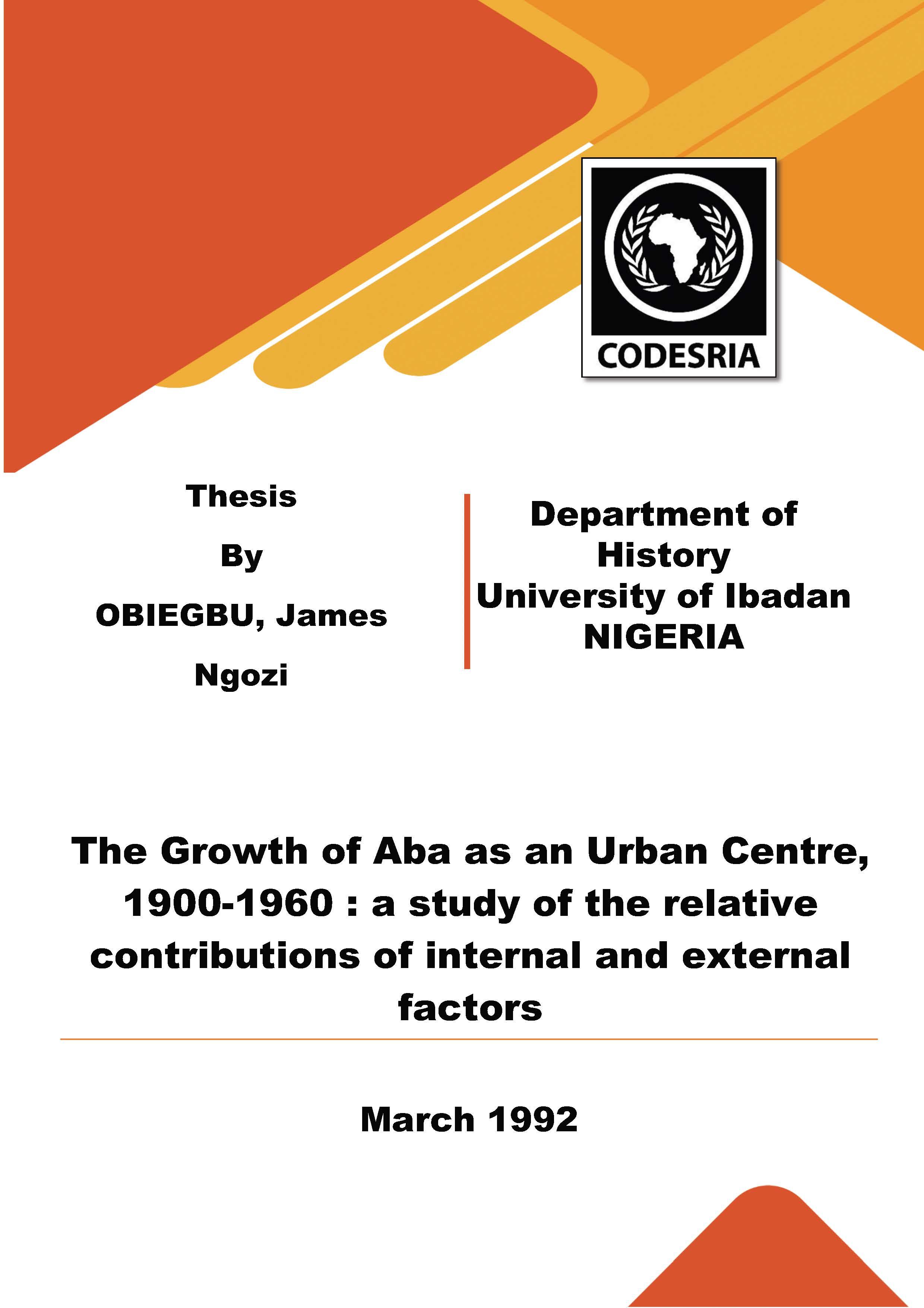The Growth of Aba as an Urban Centre, 1900-1960: a study of the relative contributions of internal and external factors
Keywords:
Growth of Aba, Urban Centre, factorsSynopsis
This· thcsis is· basically a study of the rise and growth of Aba in the period 1900-1960. Based primarily on archivai and oral sources, it attempts a reconstruction of the history of the town with a view to indicating the relative .' contributions of internai and external factors to its growth.
There are a number of existing works relating to the Aba area. The general trend in these studies is to look al Aba town either as part of the hinterland of Port Harcourt/Eastern Niger Delta, or part of the general history of the Ngwa. None of them focu~.r on Aba town or urban are a specifically. This study, as far as I am aware, is the first attempt to fill this historiographical gap. Secondly, by laying emphasis on the relative contributions of internai and external dynamics of change, it highlights the error in the notion held in some quarters that Aba town was a colonial creation.
The work demonstrates that the major stimulus for urbanization and growth in Aba was commerce. This factor and others such as strategic location had even before the British presence, engendered a trend in Aba towards urbanism. These c~~sting forces of growth continued to opera te after 1900, but were giyen a fillip by factors introduced by the British such as roads, railways, cash cconomy, Western education, health facilities, water, electricity and new forms of political and judicial administration. Their combined effect further stimulated population growth, encouraged the rise of entrepreneurship that was manifested in the emergence of numerous foreign and indigenous enterprises, and in fact, laid the infrastructure that has made Aba an important centre of indigenous manufacturing in Nigeria - "Africa's ernerging Japan" as sornc rcfcr Lo it.
The increased immigration of people attracted by economic opportunities created a situation in which the Ngwa o~ners of the
land became vastly out-numbered by the non-Ngwa residents. This had important consequences for political contests and representation. The work shows that throughout the period covered by the study, the politics of the town was dominated largely by non-Ngwa who also controlled the economy of the town. This political and economic contrai of the Ngwa by the non-Ngwa has led some scholars to conclude that the relationship between the two was one of complete animosity and rivalry. But as the work shows, this was not the case as inter-group relations in the town, despite occasional tensions, l!l.?Yt!. ··by
and large cordial.
ln all, the study demonstrates clearly that while the British presence introduced major changes in the process of Aba's growth, it was not within the context of an unresponsive African population. The work shows that colonialism did not create Aba town; that the town emerged and rose to commercial prominence m consequence of the interaction of internai and external factors. It was in facl a typical case of "continuity and challenge" at work.
Downloads
References
Alex, Miller, Blue Book: Africa No, 21888'. To the Marquis of Salisbury. The disputes of Opobo 1890.
lmo State lndustrial Directory (Maiden Ed): Published by Industries Division, Ministry of Commerce and lndustry, Owerri, 1988.
Report of the Commission of lnquiry into the Disturbances in the Calabar and Owerri Provinces, December 1929 (Government Printer, Lagos) 1930.
Population Census of the Eastern Reaion of Nigeria, 1953, Lagos 1956.
Adewoye, o. The Judicial System in Southern Nigeria, 1854 - 1954, Law and Justice in a Dependency, Long man, 1977.
Afigbo, A.E., The Warrant Chiefs: Indirect Rule in Southern-eastern Nioeria, London, 1972.Ajayi, J.F.A, History of West Africa, Vol. 1 (2nd Edition) New York.1976. & Crowder M. (Eds.).






